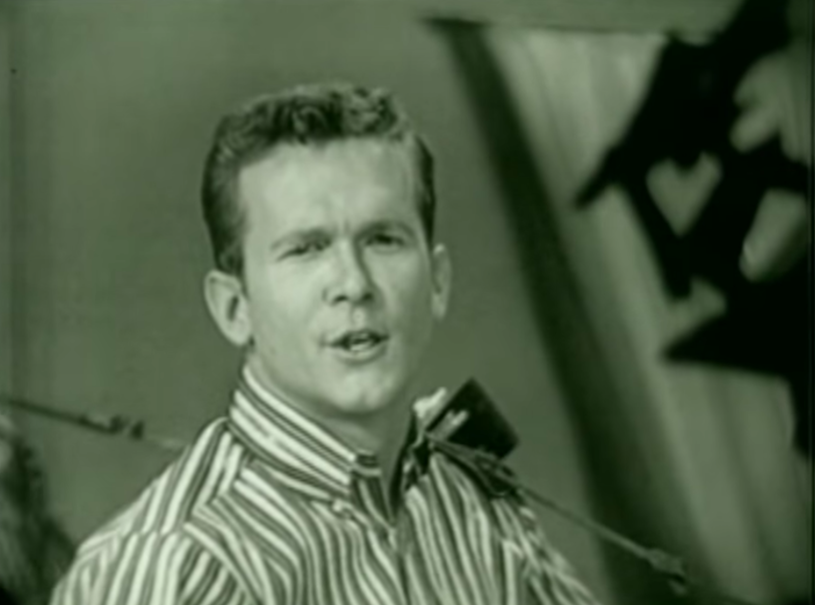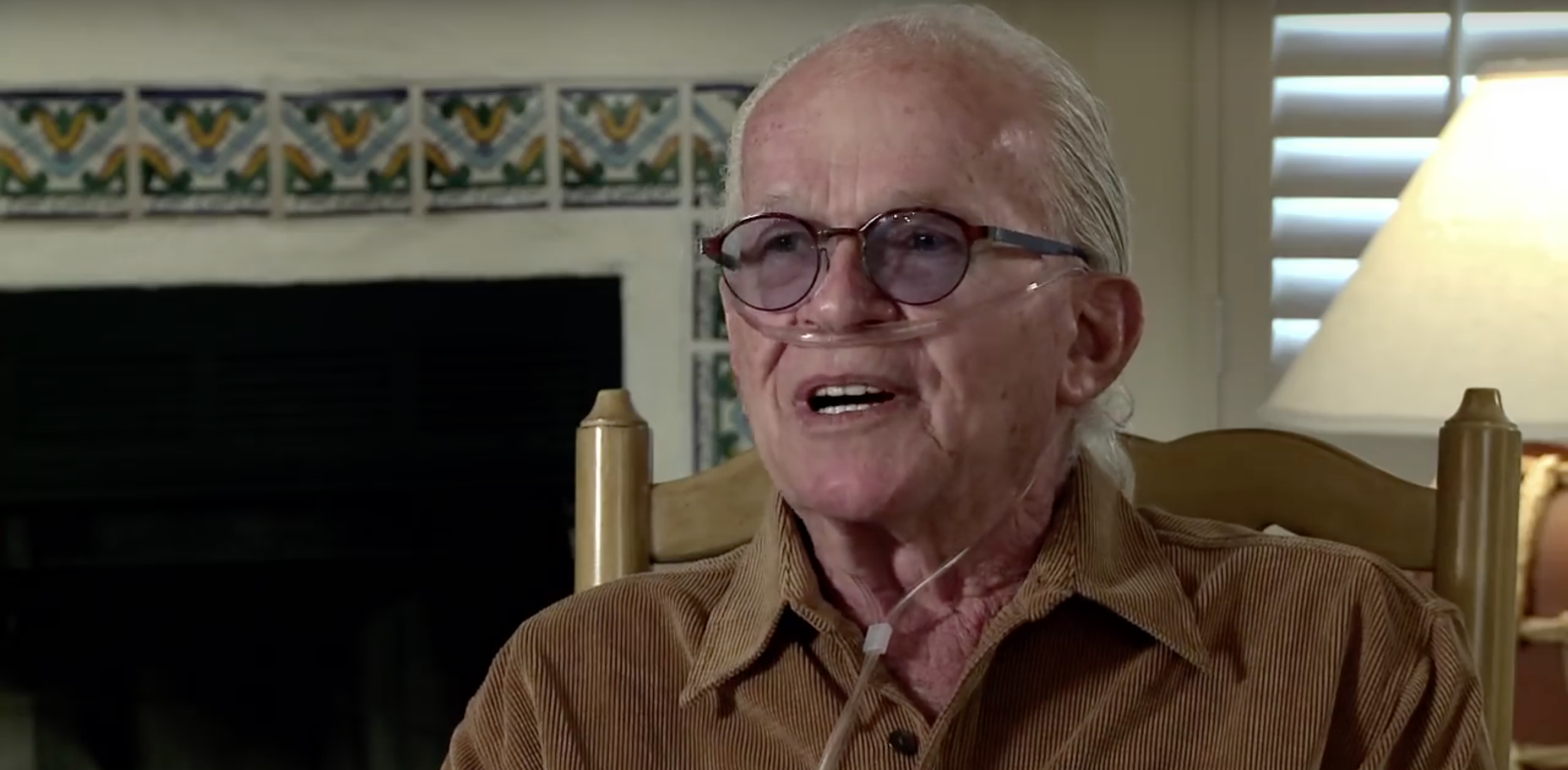
George Chip Miller/YouTube

Audio By Carbonatix
Lyssa Cohn spent three weeks in the hospital, listening to Bob Shane sing.
“I live with chronic emphysema,” explains the 32-year-old, who was hospitalized twice last year for oxygen therapy and with pneumonia. “It gets really lonely sitting in a hospital room or in the rehab place.”
During her most recent hospitalization last month, Cohn’s boyfriend brought her Amazon Echo and hooked it up for her. “I couldn’t sleep unless I could play my Kingston Trio songs,” she says. “I’ve fallen asleep to Bob Shane and John Stewart and those guys for, like, most of my adult life. I had them playing pretty much nonstop while I was in there. The PT guys would come in and say, ‘Uh, could you turn that off for just a minute?'”
A few days before she was released from a rehab facility, Cohn read that Shane, who co-founded The Kingston Trio in 1957, had died. “It was like losing my own father,” says Cohn, tearing up. “I knew he was on oxygen the last part of his life, so I named my little oxygen tank dolly after him.”
Shane was the last surviving original member of The Kingston Trio, whose close harmonies, matching striped shirts, and dashing good looks helped reboot folk music in the late ’50s. He was 85 and died in a hospice facility in Phoenix on January 26.

Bob Shane from The Kingston Trio.
George Chip Miller/YouTube
“There really isn’t a folk musician out there who doesn’t have a little bit of Kingston Trio in him somewhere,” says Dolan Ellis, a friend and longtime colleague of Shane’s.
The Trio’s influence was incalculable, says Ellis, a former member of The New Christy Minstrels, themselves a prominent part of pop music’s folk revival. “They were huge for my generation. In the mid-’50s, their music was played in every sorority house, every frat house, and on every car radio. They made an impact not just on folk music, but on American music.”
Not just American music, says Tom Gould, another friend and colleague of Shane’s. “A lot of people don’t know this, but The Beatles were big Kingston Trio fans. Lennon and McCartney started off playing banjos because they saw the Trio do it.” When the pair formed The Beatles, Gould says, they copied the close harmonies and rhythms they heard on Trio albums.
Gould, who fronts a band called The Bossa Nova Beatniks, worries that The Kingston Trio will one day be forgotten. “Those guys get pretty much ignored in a lot of the history of music,” he claims. “Their influence is a lot deeper than the history books would have you know.”
The success of Shane’s group, founded in 1957, has been pretty well documented. The Trio not only reinvented folk music in the early days of rock ‘n’ roll but sold out arenas and stadiums and appeared on every big-name network TV variety show of the day. They charted four albums simultaneously in Billboard‘s 1959 Top 10, toured into the 21st century, and hosted an annual folk music Trio Fantasy Camp in Scottsdale.
Shane’s baritone provided the Trio’s signature vocal sound, heard most famously on million-selling hits like “Tom Dooley” and “Scotch and Soda.” He sang lead on most of the group’s songs and outlived each of the other original members. Co-founder Dave Guard died in 1991, as did Nick Reynolds in 2008; John Stewart, who replaced Guard in 1961, died in 2008.
It was Shane who kept the act going, eventually taking ownership of the Kingston Trio name and fronting various versions of the group until 2004, when a heart attack forced him to stop performing.
Ellis, best known as Arizona’s Official State Balladeer since 1966, recalls doing nostalgia tours where the New Christy Minstrels and other big-deal folk groups shared the bill with the Kingston Trio. “It was us, and The Kingston Trio, and The Brothers Four, and the Chad Mitchell Trio. We did a show in Lancaster, Pennsylvania, and we went on just before the Trio. Now, The New Christy Minstrels were eight ass-kickers on stage, running around the stage getting the audience on its feet, clapping their hands and singing along.”
He worried that The Kingston Trio’s quieter set, which followed the Minstrels, would be a letdown after the rowdier show he and his band had just delivered.
“I guess I forgot for a minute how many hits those guys had,” he says with a chuckle. “We got a standing ovation at the end of our set, but the Trio got one after every song they sang. That was when I looked at them and thought, ‘Okay, they aren’t entertainers in the way we are, but they had all these million sellers. It doesn’t matter what they do onstage. These people are huge stars.'”
Shane wasn’t a patsy, Ellis says. “Bob was a cocky kind of a guy,” Ellis says. “That’s what made him so attractive. The girls went crazy over him. He was a real self-assured kind of fellow, and he bumped heads with a lot of people, but he was really a nice guy, always happy. I know Dave Guard was considered the brains of the outfit, but Bob was the backbone.”
The Trio’s legacy, Ellis says, is set in stone. “They’ll be the icons of that era. They will be indelible in music history forever. Just like we remember Bach as a musical icon of his age, we’re gonna remember The Kingston Trio as icons of their age. As far as the history of folk music, Bob Shane and those guys carried the ball.”